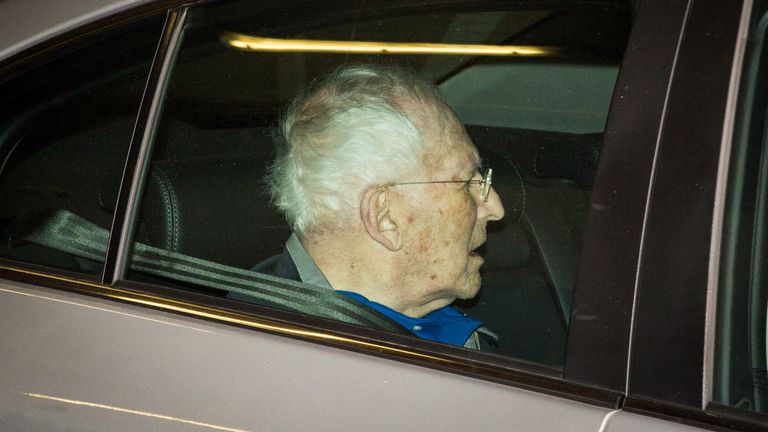‘Fear and embarrassment’ stopped children allegedly abused by Janner from reporting it, inquiry told
“Fear, shame, embarrassment and confusion” prevented children in care homes – allegedly abused by the late Lord Janner – from immediately reporting it to police, the Independent Inquiry into Child Sexual Abuse (IICSA) has heard.
Janner, a Labour MP from 1970 until 1997 when he was made a peer in the House of Lords, died in 2015.
He was awaiting trial for 22 counts of child sexual abuse offences, relating to nine different boys, which he denied.
In a statement, his youngest daughter, Rabbi Laura Janner-Klausner, said: “We have listened carefully to all the serious accusations, we believe as totally in our father’s innocence today as we always have.”
The family said they believed he “became a target” for a number of reasons, including “his particular public profile and being financially comfortable in his later years”.
Brian Altman QC, counsel to the inquiry, said complainants were worried they “would not be believed”, while another said social care staff were “very dismissive” when their concerns were raised.
Lawyer David Enright said one alleged victim described how it felt like “poor children are on a conveyor belt to abuse, and that nobody seems to believe them”.
The latest strand of the IICSA began on Monday, examining institutional responses to allegations of child sexual abuse against Lord Janner dating back half a century.
In an opening statement, Mr Altman said Leicestershire Police conducted two investigations into the allegations – in 1999 and 2012 – but that neither resulted in charges being brought.
He said: “How and why no charges were brought will be the focus of much of the evidence you will hear over the next three weeks.”
He told the panel: “This is not an investigation into Lord Janner’s guilt or his innocence, it is not a proxy criminal trial or a civil trial.”
Nick Stanage, representing more than a dozen complainants, told the inquiry: “That prosecution came many years after allegations first surfaced – it was a prosecution that came too late.
“For our clients, justice delayed was justice denied.”
He added: “Prominent people accused of child sex offences should be prosecuted with the same determination and the same vigour as any defendant.”
Christopher Jacobs, representing some of the complainants, told the inquiry that his clients were abused in care in Leicestershire decades ago, and that Lord Janner “was able to act with impunity”.
Mr Jacobs described the ordeal suffered by Tracey Taylor, a complainant who has waived her right to anonymity, who was sent to care home as a 14-year-old in the 1970s and was later allegedly raped by Lord Janner.
He told the inquiry: “She said she was raped by a man who said his name was Greville Janner, he said he was an MP and that he could make her the next prime minister’s wife.
“She has told the police about the abuse, but she has never been believed due to her mental health problems.
“On some occasions, police mocked her statements calling her Crazy Tracey.”
The inquiry heard accusations that Lord Janner’s prominence “presented barriers to interview, arrest and prosecution”.
Edward Brown QC, on behalf of the Crown Prosecution Service (CPS), said: “We do not believe there is any evidence or issue as to whether the CPS acted improperly.
“Any notion that a CPS lawyer acted improperly or somehow did not want to prosecute if there is evidence to do so is unfair.”
He said the decision whether or not to prosecute Lord Janner were “judgement calls, honestly made”.
Sam Leek QC, representing Simon Cole, the chief constable of Leicestershire Police, said: “The chief constable deeply regrets that allegations made to Leicestershire Police during previous investigations were not investigated or progressed as fully as they could and should have been.”
Previously, the investigation into MPs, peers and civil servants working at Westminster found political institutions “significantly failed in their responses to allegations of child sexual abuse”.
But it said there was no evidence of a “Westminster paedophile ring” – allegations made in the House of Commons in 2012 which triggered the multimillion-pound inquiry, and later resulted in the prosecution and conviction of fantasist Carl Beech.
The remaining three avenues of the inquiry – including the Lord Janner strand – are due to hear evidence this year, before a final report of overarching findings from all 15 sections of the investigation is laid before parliament in 2022.
Source: Read Full Article



